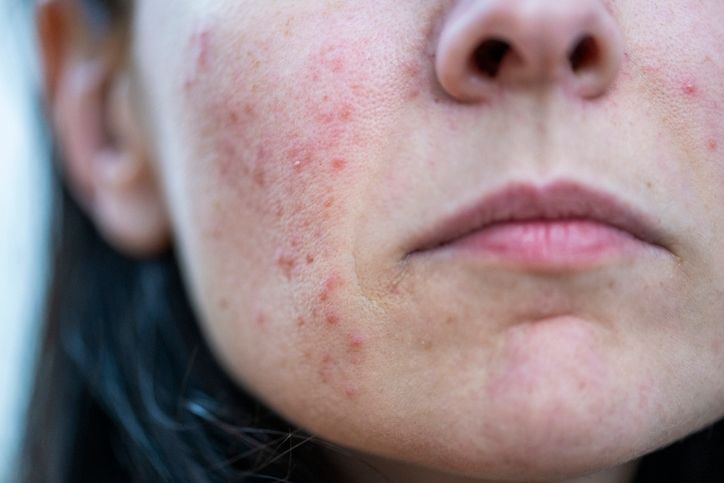Author: Natalie Ng|Updated: 15 May 2025
When skin takes longer to heal or looks irritated, chronic inflammation could be part of the problem. It affects how your body repairs itself and can show up in ways like breakouts, redness, or slow recovery after treatments. Over time, it’s also linked to issues like heart disease, rheumatoid arthritis and high blood pressure. Food plays a big role in all of this. Some choices like fried foods, red meat and refined carbs can trigger inflammation in the body. Others do the opposite. An anti inflammatory diet built around whole foods, fruits and vegetables, healthy fats and anti inflammatory nutrients can support your immune system and help repair skin from within. These ingredients have been shown to lower inflammatory markers and ease symptoms of chronic diseases. Ahead, we’ll look at seven anti inflammatory foods that support natural recovery processes and offer real skin benefits.

Wild-Caught Salmon and Fatty Fish That Help Reduce Skin Inflammation
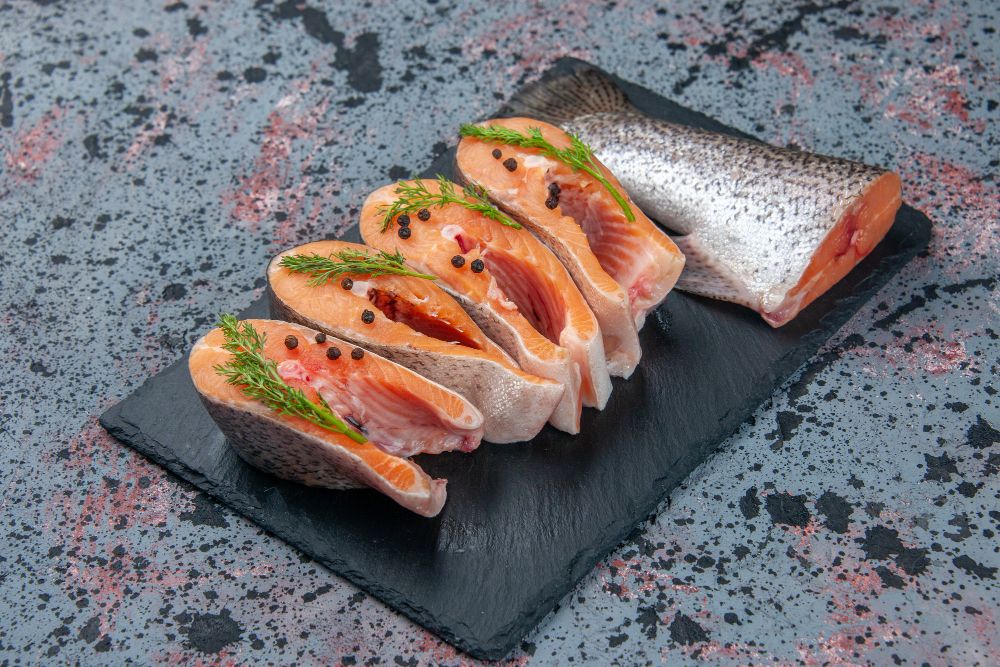
Omega-3s reduce inflammation in the body
Wild-caught salmon, sardines, mackerel and herring are rich in omega-3 fatty acids, known for their strong anti inflammatory effects. These healthy fats lower inflammatory proteins and support the immune system, helping to reduce inflammation in the body and improve skin recovery.
Nutrients that support skin healing
Fatty fish also provide high-quality protein to rebuild damaged tissue and boost collagen production. They’re a source of vitamin D and selenium—two nutrients linked to skin repair and protection against UV damage. These anti inflammatory nutrients may also help ease symptoms of rheumatoid arthritis, lower blood pressure and reduce the risk of cardiovascular disease and inflammatory bowel disease.
Eating fatty fish regularly supports natural recovery processes and offers many health benefits. Two servings per week can make a difference when included as part of a healthy diet focused on whole foods, fruits and vegetables, healthy fats and anti inflammatory meals.

Turmeric and Ginger Root to Support Skin Repair and Inflammatory Relief
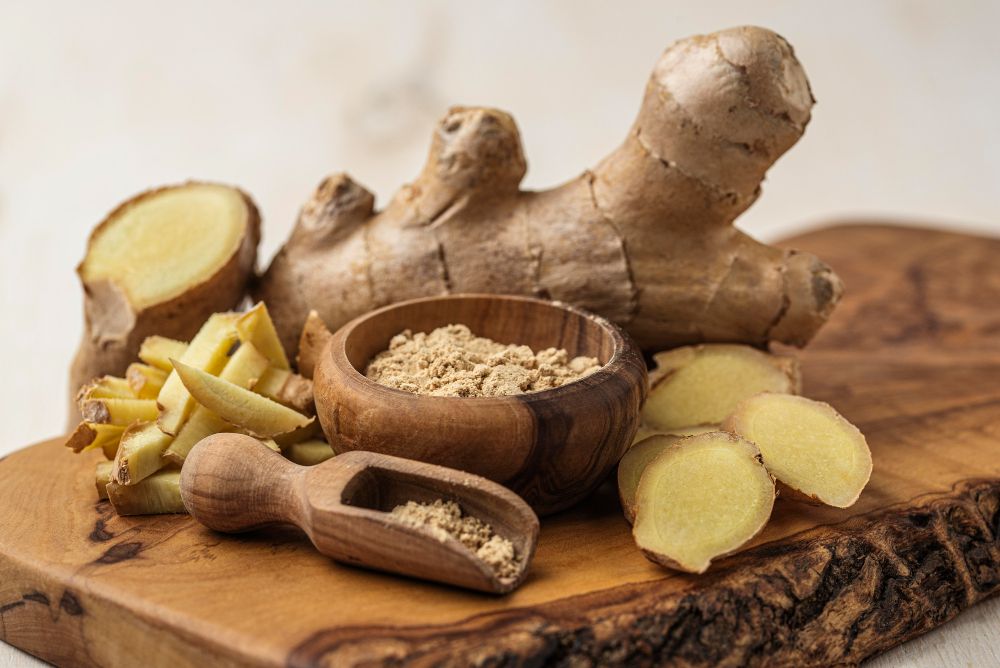
Anti inflammatory compounds found in turmeric and ginger
Turmeric and ginger have long been used in traditional medicine for their anti inflammatory properties. Both come from the same plant family and contain powerful compounds that reduce inflammation in the body. Curcumin in turmeric and gingerols in ginger are known to lower inflammatory biomarkers and support tissue repair at the cellular level.
Impact on skin healing and circulation
These roots help the skin recover by stimulating collagen production, which supports elasticity and reduces early signs of aging. They also improve blood flow, helping the skin get more oxygen and nutrients. Better circulation means better healing and fewer flare-ups tied to chronic inflammation.
Benefits for acne-prone or sensitive skin
Turmeric and ginger have antimicrobial and antioxidant effects that protect the skin from environmental stress, support the immune system and lower the risk of acne and other inflammatory skin conditions. Their anti inflammatory nutrients also reduce visible redness and skin discomfort caused by body wide inflammation.
Simple ways to include turmeric and ginger in anti inflammatory meals
Both are easy to add to a healthy diet. Use them fresh, dried, or in teas. Turmeric works well in soups, stews and rice. Ginger pairs with smoothies, stir-fries and infusions. They can also be used in vegan and vegetarian diets or as part of a mediterranean diet focused on whole foods and natural recovery processes.
Read More
Book Now to Experience
Acne Treatment
1 Minute Self-Registration
Date should not be before minimal date

Dark Leafy Greens Packed with Nutrients That Combat Skin Inflammation
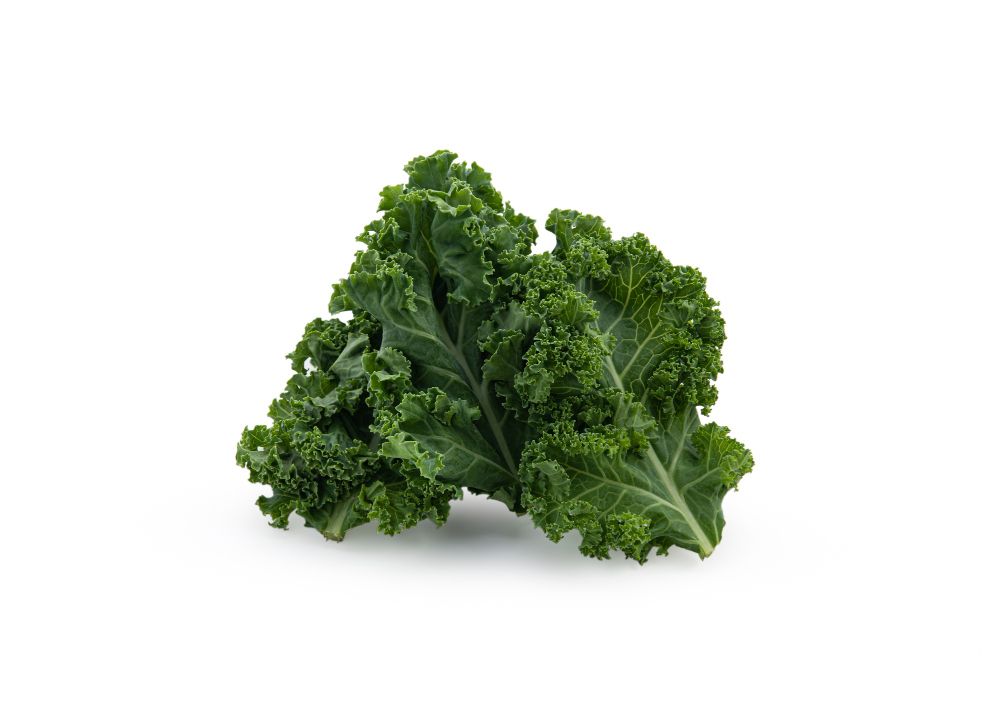
Nutrient dense greens that support skin healing
Dark leafy greens like kale, spinach, chard and collards are packed with anti inflammatory compounds that support skin health. These vegetables contain natural antioxidants, including vitamins A, C and E, which help reduce inflammation in the body and protect against environmental stress.
Importance of key nutrients found in greens
Each green offers specific anti inflammatory nutrients that support skin repair:
• Kale
Key nutrients: Vitamin C, Vitamin K
Serving: 1–2 cups raw
• Spinach
Key nutrients: Iron, Folate
Serving: 2 cups raw
• Swiss Chard
Key nutrients: Magnesium, Beta-carotene
Serving: 1 cup cooked
• Collards
Key nutrients: Calcium, Fiber
Serving: 1 cup cooked
Additional skin benefits from chlorophyll and hydration
These greens also contain chlorophyll, which supports detoxification and helps combat inflammation in the body. Their high water content helps maintain moisture levels in skin cells, reducing dryness and improving overall texture.
Adding these vegetables to anti inflammatory meals helps lower the body’s dietary inflammatory potential while supporting natural recovery processes and improving skin tone and resilience.

Sweet Potatoes and Orange Produce That Strengthen and Rebuild Skin
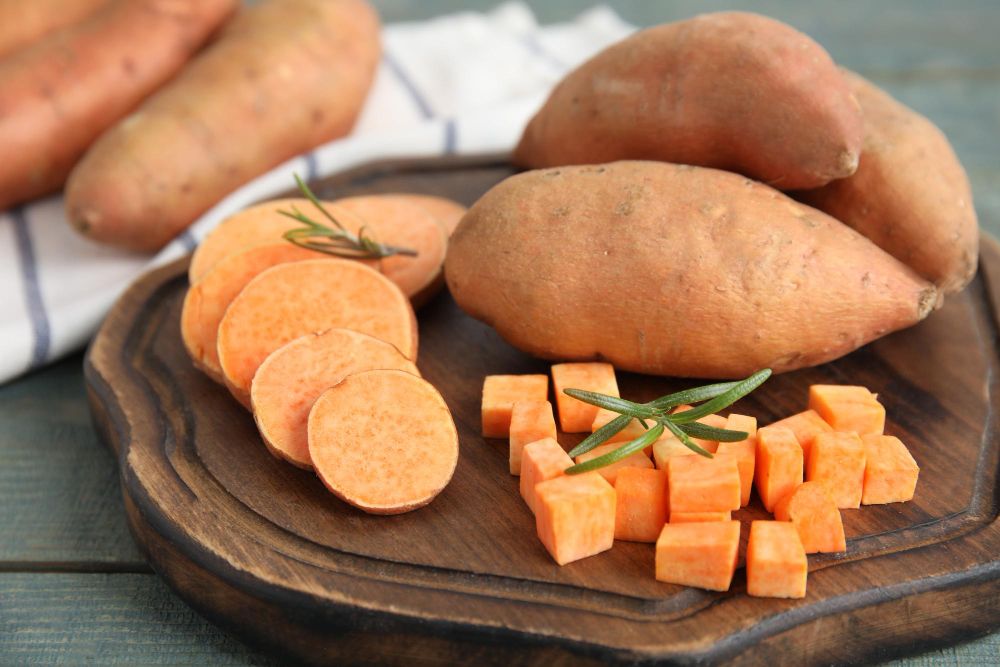
Anti inflammatory benefits of orange-colored foods
Orange fruits and vegetables are rich in beta-carotene, a powerful anti inflammatory compound that the body converts into vitamin A. This nutrient supports skin cell renewal and helps protect against damage caused by sun exposure and environmental stress.
Key orange foods that support skin health
• Sweet Potatoes
- Provide beta-carotene and vitamin C
- Help build collagen and strengthen the skin’s barrier
• Carrots
- High in antioxidants that fight inflammation and neutralize free radicals
- Support skin clarity and repair
• Butternut Squash
- Rich in essential minerals for skin cell turnover
- Supports tissue healing and reduces oxidative stress
• Orange Bell Peppers
- Contain both vitamin A and vitamin C
- Help maintain elasticity and reduce signs of skin aging
How these foods support skin recovery
• Reduce inflammation in the body and support the immune system
• Protect skin cells from UV damage and oxidative stress
• Help prevent dryness and dullness linked to nutrient deficiencies
• Offer anti inflammatory nutrients that work well in vegan and vegetarian diets or a mediterranean diet
Including these vibrant foods in anti inflammatory meals boosts the skin’s natural recovery processes and supports long-term skin health.
Book Now to Experience
Acne Treatment
1 Minute Self-Registration
Date should not be before minimal date

Green Tea and Herbal Infusions That Soothe Skin and Reduce Inflammation
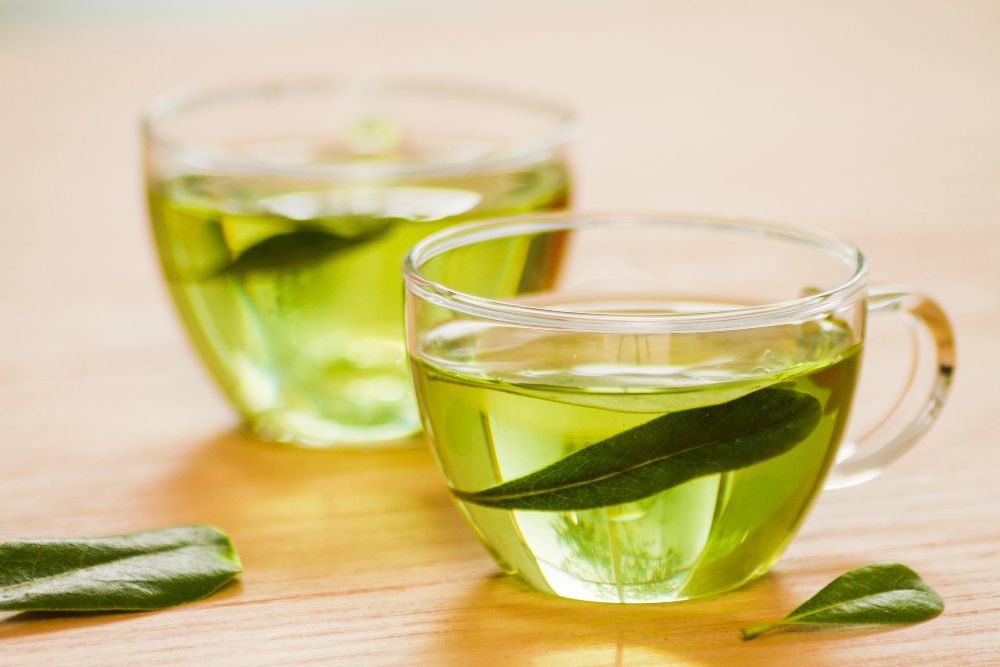
Anti inflammatory compounds found in green tea and herbs
Green tea and certain herbal teas contain high levels of polyphenols and antioxidants that help reduce inflammation in the body. These compounds support skin repair, calm irritation and protect against long-term damage.
Benefits of green tea for skin health
• Contains EGCG (epigallocatechin gallate)
- A powerful antioxidant that neutralizes free radicals
- Helps reduce redness and inflammation in skin tissue
- Supports collagen preservation and skin barrier health
Herbal infusions that support skin healing
• Chamomile Tea
- Contains bisabolol and chamazulene
- Soothes irritation and supports tissue regeneration
• Rooibos Tea
- Rich in aspalathin and nothofagin
- Offers antioxidant protection against environmental stress
- Supports skin clarity and reduces visible signs of aging
How these drinks support an anti inflammatory diet
• Help lower inflammatory markers linked to chronic inflammation
• Offer hydration that supports skin cell recovery
• Work well as part of whole food-based anti inflammatory meals
• Provide a caffeine-free option for those following a vegan or mediterranean diet
Including these teas regularly in your daily routine supports natural recovery processes and promotes healthier, more resilient skin.

Berries and Dark Fruits That Repair Skin and Ease Inflammation
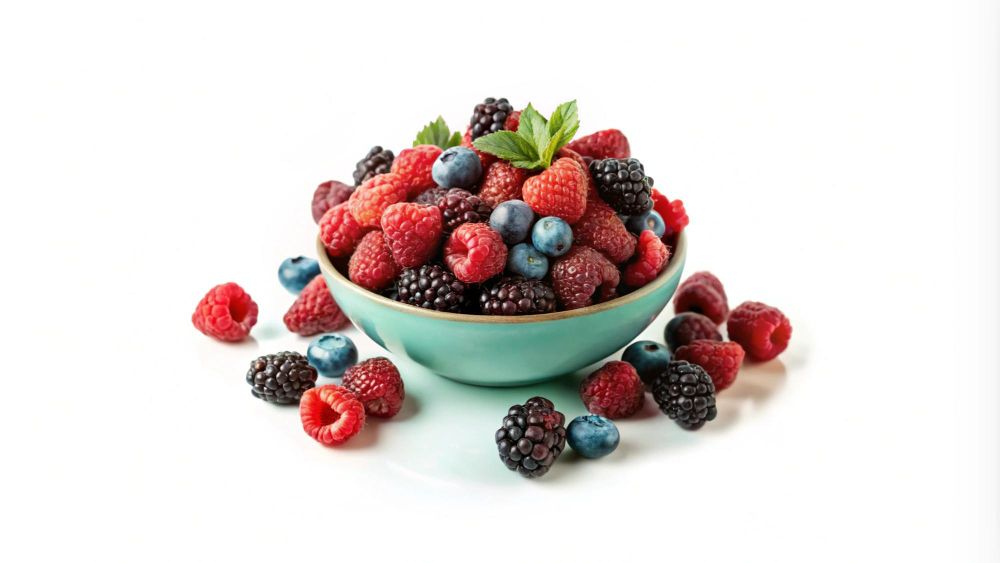
Anti inflammatory properties of deeply pigmented fruits
Berries and dark-colored fruits are rich in flavonoids, anthocyanins and other plant-based antioxidants that reduce inflammation in the body. These compounds help protect skin cells, support collagen and improve overall skin texture.
Key fruits that support skin repair
• Blueberries
- Contain resveratrol and pterostilbene
- Help prevent UV damage and reduce oxidative stress
• Blackberries
- High in ellagic acid
- Support collagen production and skin elasticity
• Pomegranates
- Rich in punicalagins
- Reduce inflammation and slow signs of aging
• Acai Berries
- Provide omega fatty acids and vitamin E
- Strengthen the skin’s moisture barrier and reduce dryness
Tips for daily consumption
• Choose organic berries when possible to reduce exposure to pesticides
• Eat them fresh and raw for maximum anti inflammatory benefits
• Frozen options are also effective and nutrient dense
• Easily added to anti inflammatory meals like smoothies, salads or whole grain breakfast bowls
These fruits support natural recovery processes and offer strong protection against environmental triggers that promote inflammation in the body.
Book Now to Experience
Acne Treatment
1 Minute Self-Registration
Date should not be before minimal date

Nuts and Seeds That Strengthen Skin and Lower Inflammation
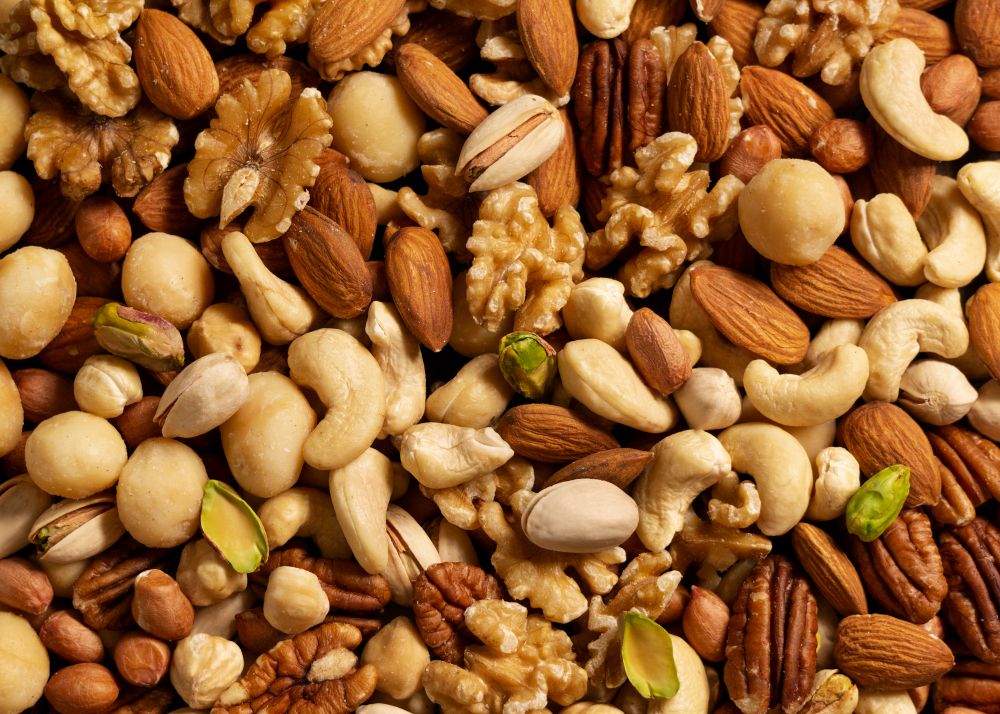
Nutrients that support skin repair from within
Nuts and seeds are dense in healthy fats, anti inflammatory compounds, and key minerals that reduce inflammation in the body. They protect skin from oxidative damage and support tissue recovery.
Specific types and their anti inflammatory effects
• Walnuts
- Provide omega-3 fatty acids
- Reduce redness and support skin hydration
• Chia Seeds
- Contain alpha-linolenic acid
- Lower inflammatory markers and improve skin texture
• Flaxseeds
- Offer lignans and omega-3s
- Help prevent tissue breakdown from oxidative stress
• Almonds
- Deliver vitamin E and zinc
- Boost collagen production and repair skin damage
Mineral content that supports skin healing
• Zinc
- Promotes collagen formation and controls inflammation
• Selenium
- Supports elasticity and reduces oxidative stress
• Magnesium
- Eases stress-related skin symptoms and improves moisture balance
• Copper
- Speeds up wound healing and supports connective tissue
• Iron
- Improves oxygen flow to skin cells and aids tissue regeneration
Benefits in an anti inflammatory diet
• Work well in vegetarian diets, vegan diet and the mediterranean diet
• Help reduce dietary inflammatory potential
• Lower risk of chronic diseases such as heart disease, high blood pressure and rheumatoid arthritis
• Support immune system function and skin resilience
Including a variety of nuts and seeds in daily meals supports skin structure and reduces inflammation in the body over time.

Cruciferous Vegetables That Help Clear Skin and Lower Inflammation
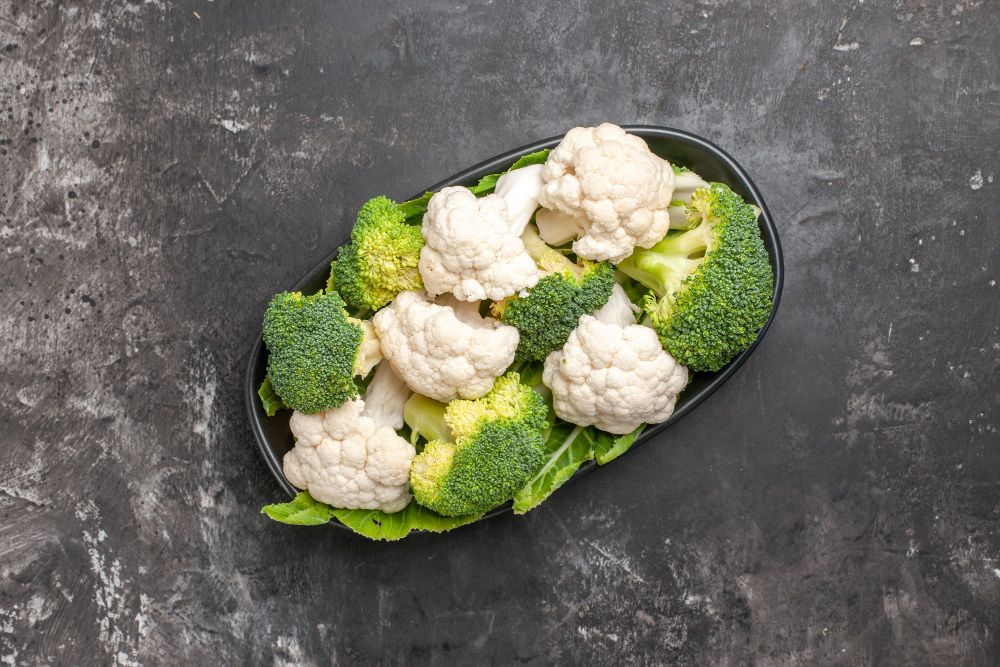
Detox-supporting vegetables that reduce oxidative stress
Cruciferous vegetables like Brussels sprouts, broccoli, cauliflower, and bok choy are rich in compounds like sulforaphane and glucosinolates. These anti inflammatory nutrients support detoxification and reduce inflammatory messengers in the body.
Benefits for skin and inflammation control
• Help reduce oxidative stress and protect skin cells
• Support liver detox, which can indirectly ease skin congestion and acne
• Contain fiber and vitamin C to support gut and immune system health
• Fit well into a mediterranean diet or vegan diet
Regularly including cruciferous vegetables in anti inflammatory meals can support skin healing and reduce dietary inflammatory potential.
Book Now to Experience
Acne Treatment
1 Minute Self-Registration
Date should not be before minimal date

Fermented Foods That Balance Gut Health and Support Skin Recovery
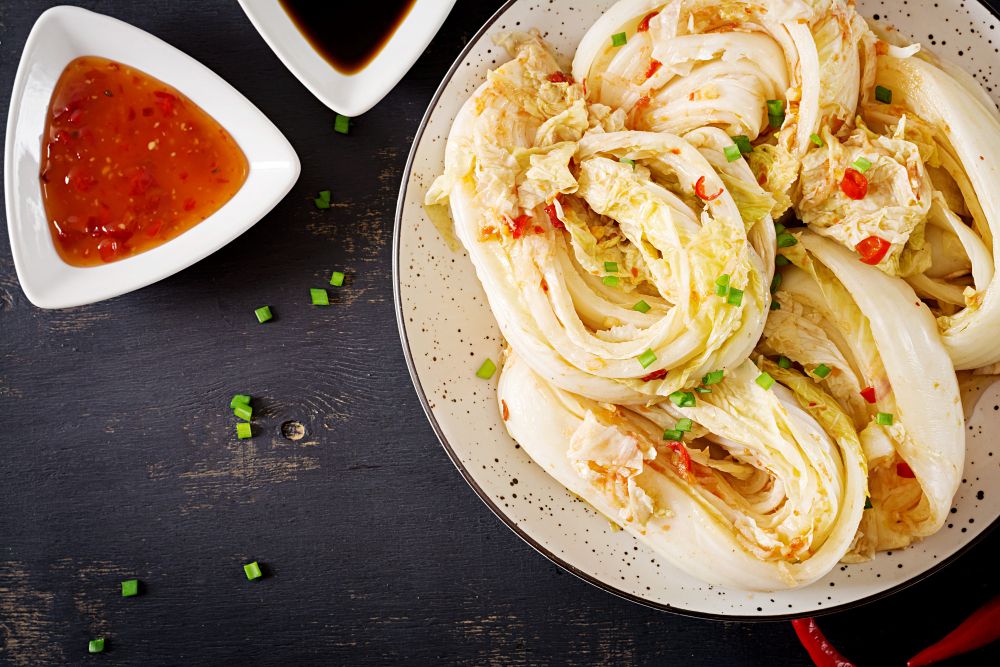
Natural probiotics that calm internal inflammation
Fermented foods like kimchi, sauerkraut, yogurt, and kefir are rich in live cultures that support gut health. A stable gut microbiome helps regulate inflammation in the body, which may reduce the frequency and intensity of acne flare-ups.
Why gut health influences the skin
• Healthy gut flora reduces inflammatory biomarkers
• May improve nutrient absorption and immune system regulation
• Supports a more balanced oil production by reducing internal triggers
• Complements anti inflammatory foods for stronger results
These foods are ideal additions to a whole food or plant-based anti inflammatory diet and can help the skin recover more effectively from chronic inflammation.

Legumes That Offer Plant-Based Support for Inflammation Relief
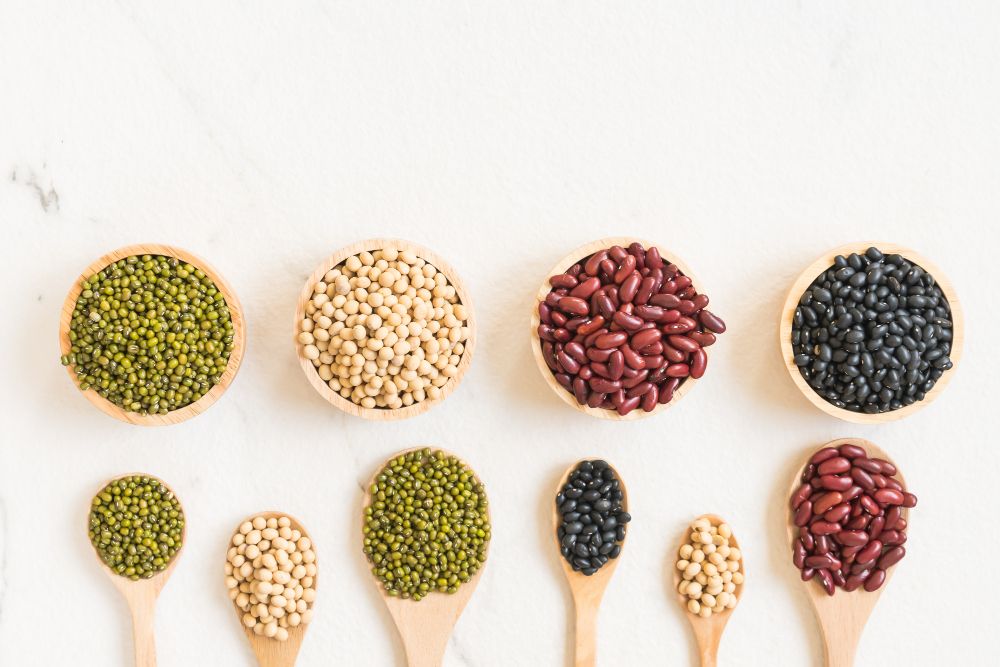
Nutrient-dense protein alternatives that support skin clarity
Legumes such as lentils, chickpeas, black beans, and peas provide fiber, plant protein, and key minerals without the inflammatory risks of processed meats or high-fat dairy.
Anti inflammatory benefits of legumes
• Help lower levels of inflammatory proteins
• Promote digestive regularity, supporting natural detox
• Support collagen production through amino acids and iron
• Work well in vegan and vegetarian diets for skin health
Adding legumes to anti inflammatory meals not only supports the immune system but also helps reduce body wide inflammation and supports skin regeneration from the inside out.
Book Now to Experience
Acne Treatment
1 Minute Self-Registration
Date should not be before minimal date

Foods That Trigger Inflammation and Disrupt Skin Repair
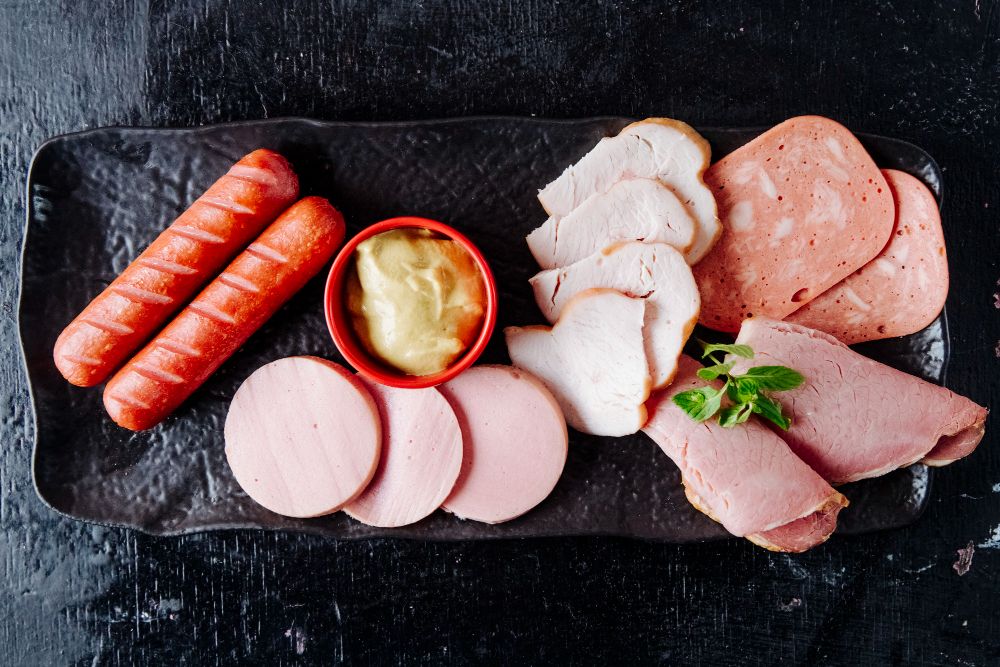
Ingredients linked to increased inflammatory markers
Certain foods are known to promote inflammation in the body and may delay skin healing or worsen skin conditions. These ingredients increase the body’s inflammatory response and can affect collagen, hydration and overall skin resilience.
• Processed Meats
- Hot dogs, bacon, and sausages contain preservatives and saturated fats that may increase inflammatory messengers and damage skin cells.
• Refined Carbohydrates
- White bread, pastries, and similar products made with refined flour can raise blood sugar quickly, which may worsen inflammation in the body.
• Fried Foods
- High in saturated fats and advanced glycation end products (AGEs), which are linked to oxidative stress and inflammatory skin reactions.
• Sugary Snacks and Beverages
- Excess sugar intake can interfere with collagen formation and promote chronic inflammation that shows up as redness or breakouts.
• Processed Snack Foods
- Chips and packaged snacks often include unhealthy oils and artificial additives that may trigger inflammation and skin irritation.
Ingredients that can worsen existing skin concerns
• High-Fat Dairy
- Full-fat dairy may affect some individuals by increasing inflammatory responses or disrupting the skin’s natural oil balance.
• Alcohol
- Excessive alcohol may lead to dehydration and slow down tissue recovery, increasing visible signs of inflammation and irritation.
• Excess Caffeine
- Too much caffeine can interfere with sleep and hydration, both of which are important for healthy skin regeneration.
Avoiding these ingredients and focusing on whole grains, fruits and vegetables, and healthy oils like extra virgin olive oil can reduce dietary inflammatory potential and support long-term skin repair.

Dietary Patterns That Support Skin Health and Reduce Chronic Inflammation

Long-term habits that improve inflammatory response
Following certain eating styles consistently can help lower body wide inflammation and improve skin healing over time. These dietary patterns are based on whole foods and nutrient-dense choices that supply anti inflammatory compounds and reduce inflammatory proteins in the body.
• Mediterranean Diet
- Focuses on whole grains, fruits and vegetables, fatty fish, olive oil and legumes
- Reduces inflammatory biomarkers and supports cardiovascular health
- Shown to improve skin hydration and protect against collagen breakdown
• Vegan and Vegetarian Diets
- Plant-based meals are rich in natural antioxidants, fiber and anti inflammatory nutrients
- Associated with lower risk of chronic diseases like heart disease and high blood pressure
- Helps reduce inflammatory messengers linked to inflammatory bowel disease and rheumatoid arthritis
• Whole Foods-Based Eating
- Emphasizes unprocessed foods and limits fried foods, refined carbs and processed meats
- Supports immune system balance and reduces dietary inflammatory potential
- Encourages stable energy levels and improved skin recovery
These eating patterns work by removing inflammatory foods and replacing them with meals rich in healthy fats, fiber, and anti inflammatory properties. Consistency in these choices helps lower chronic inflammation and strengthens the skin’s ability to heal and rebuild.

Combining Acne Treatment with Anti Inflammatory Foods for Clearer, Stronger Skin
Why pairing skincare treatments with anti inflammatory nutrition helps
Eating anti inflammatory foods is one way to calm chronic inflammation in the body, which includes inflammation in the skin. But for many people, food alone isn’t enough to fully address acne-prone skin, especially when pores are already clogged, oil production is unbalanced, or acne has progressed to scarring. That’s where Acne Treatment comes in.
This non-invasive treatment targets acne, oily skin, acne scars and inflammation directly at the surface. It works alongside your anti inflammatory diet to speed up results and strengthen skin from both the inside and outside.
How Acne Treatment works
• Step 1: The skin is assessed, and a patch test is done to ensure skin compatibility.
• Step 2: A dual spiral suction probe deeply exfoliates and drains out dead skin, excess oil and bacteria from clogged pores. This helps reduce acne inflammation and infection at the surface level.
• Step 3: A medical-grade hydrating serum is infused into clean skin, calming oil glands, rebalancing the skin’s oil-water ratio and supporting collagen growth.
This process supports the natural recovery processes of the skin and helps ease the same inflammatory markers that anti inflammatory meals target internally.
Benefits that enhance anti inflammatory effects
• Reduces blocked pores, acne breakouts, and visible oiliness
• Helps skin stay calm and hydrated
• Lowers future risk of inflammation-triggered breakouts
• Requires no injections, oral antibiotics or downtime
• Safe for moderate to severe acne and suitable for different skin types
When paired with anti inflammatory nutrients from foods like berries, green tea, leafy greens and fatty fish, this treatment helps your skin stay clearer and recover faster. It's a practical option for anyone trying to reduce inflammation in the body and improve skin health naturally.
Book your Acne Treatment consultation today and take the next step toward stronger, clearer skin.
New Beauty's Acne TreatmentBook Now to Experience
Acne Treatment
1 Minute Self-Registration
Date should not be before minimal date
FAQ
Can anti inflammatory foods help with hormonal acne?
Yes. Hormonal acne is often linked to imbalances that can trigger inflammation in the body. Eating anti inflammatory foods like leafy greens, fatty fish, flaxseeds, and berries may help lower inflammatory messengers and stabilize insulin levels, which can impact hormone-related breakouts. Including foods that reduce inflammation may also support skin repair and reduce acne scarring over time.
What is the difference between anti inflammatory diets and elimination diets?
An anti inflammatory diet focuses on including foods that calm inflammation in the body, such as whole grains, natural antioxidants, healthy fats, and anti inflammatory nutrients. An elimination diet removes specific foods that may trigger symptoms like digestive issues, inflammation or skin flare-ups. Both can reduce inflammation in the body, but anti inflammatory diets are more sustainable long-term and rich in nutrient-dense foods that benefit skin health and the immune system.
Are there any snack foods that are anti inflammatory?
Yes. Many people think snack foods must be processed, but there are options that align with anti inflammatory meals. Examples include raw nuts, pumpkin seeds, hummus with sliced vegetables, unsweetened yogurt, or smoothies made with anti inflammatory compounds like turmeric or ginger. These snacks can help manage blood sugar, reduce inflammation in the body, and support skin clarity without triggering breakouts.
Can chronic inflammation worsen pigmentation or skin tone?
Chronic inflammation can disrupt the skin’s healing process and increase melanin production in certain areas, which may lead to uneven tone or post-acne pigmentation. Inflammatory proteins released during flare-ups may affect collagen and increase oxidative stress. An anti inflammatory diet that includes fruits and vegetables, healthy oils, and natural recovery processes can help support clearer, more even-toned skin.
Is there a link between inflammation and weight gain?
Yes. Chronic low-grade inflammation has been linked to weight gain and fat accumulation, especially around the midsection. Diets high in processed foods, saturated fats, and refined carbohydrates can promote inflammation in the body. Choosing anti inflammatory foods that support metabolism and immune system health may help manage weight while also reducing the risk of conditions like cardiovascular disease and high blood pressure.
Recommended Articles
COPYRIGHT© NEW BEAUTY MANAGEMENT LIMITED 2026. ALL RIGHT RESERVED.

